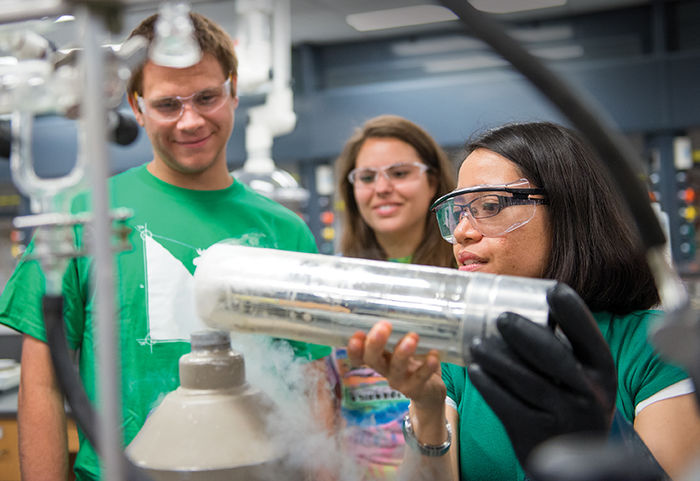“One reason we now have a shortage of math teachers is that when a student shows an interest and an aptitude for math, we say, ‘That’s great. Have you thought about engineering? Or being an actuary?’ We funnel them into fields that use math, but not into teaching math. We need to change that.”
—Dr. Courtney Nagle, Associate Professor of Mathematics Education
Faculty members in the School of Science have secured $2 million in National Science Foundation funding to develop a STEM leadership and development program and promote mathematics education as a career option. The funding, spread across two projects, includes scholarship opportunities for seventy-five Penn State Behrend students.
Dr. Martin Kociolek, director of the School of Science and associate professor of chemistry, will oversee a five-year, $1 million initiative, funded by the NSF S-STEM (science, technology, engineering, and mathematics) grant program, to help students develop the skills and mindset that are necessary to succeed in STEM majors and careers. He and four colleagues—Dr. Courtney Nagle, associate professor of mathematics education; Dr. Charisse Nixon, professor of psychology; Dr. Dipo Onipede, associate director of academics and chair of the Industrial Engineering program in the School of Engineering; and Dr. Michael Rutter, associate director of the School of Science and associate professor of statistics—will create a STEM Leaders program that will provide financial, academic, social, personal, and career support to help students persist and succeed in STEM majors.
“We’re taking a cue from social cognitive career theory, which looks at why students choose a particular career path and how they stay on it and succeed,” Kociolek said. “One goal is to encourage persistence. Many students in STEM majors come in with preconceived notions of their ability to succeed and are discouraged by early challenges or setbacks. By developing programming that builds core competencies in mathematics and promotes self-efficacy, we can reinforce and support their career goals.”
The STEM Leaders program will form three 20-student cohorts over three years, with a living-learning community in Trippe Hall. Participants will have access to targeted programming, academic and career-planning support, mentoring, leadership training, and capstone research opportunities. Students will be eligible for $13,500 in scholarship funding over four years in the program.
STEM Leaders will follow one of two mathematics tracks, both of which will focus on self-efficacy as well as mathematical competencies.
“Math is a definite pinch point for success in STEM,” Kociolek said. “A strong foundation there is the key to success in many future STEM classes.”
Students who thrive in mathematics classes could benefit from the second NSF-funded program, which will develop a pipeline of mathematics teachers who are committed to teaching in “high-needs” school districts.
The program, which is supported by $1 million in NSF funding from the Robert Noyce Teacher Scholarship Program, will promote teaching as a career path: Behrend sophomores will be eligible for paid internships, which will require sixty hours of engagement with students in the partner districts. In their junior and senior years, they will be eligible for Noyce scholarships, which provide $22,500 in each year. Specific districts with teacher shortages will be targeted, including the Erie, Corry Area, Iroquois, and Northwestern school districts.
“It’s often difficult for students to see the potential for math,” said Nagle, who will oversee the study. She will work with Rutter; Dr. Paul Becker, associate professor of mathematics; Pat Kelly, lecturer in mathematics education; and Jodie Styers, assistant teaching professor of mathematics education, to develop an Aspiring Mathematicians Program for local high school students.
